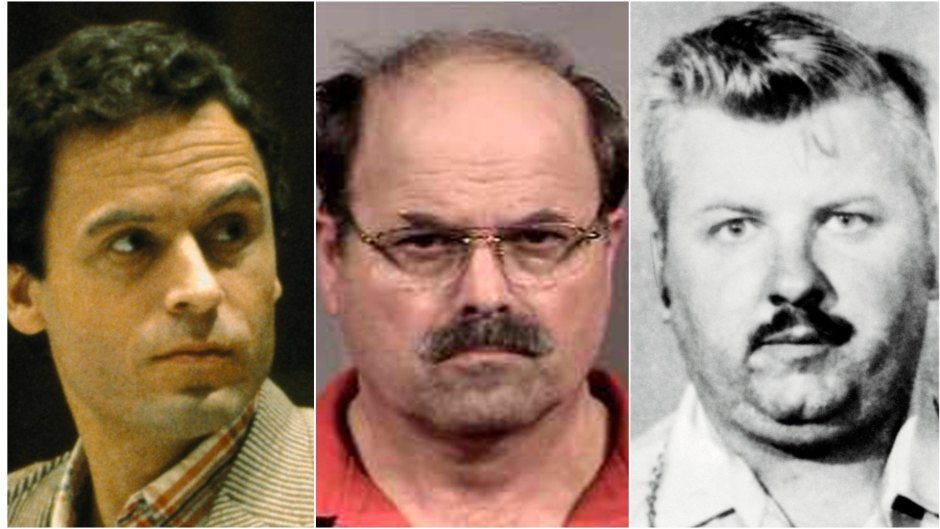
Getting Inside the Mind of BTK and Other Serial Killers: Trying to Understand the Madness (Exclusive)
Whether we like it or not, serial killers are among us and they could be anyone. That’s certainly the sense you get from the ongoing fascination with, and exploration of, serial killers, whether talking about real-life murderers like Ted Bundy, John Wayne Gacy or Dennis Rader (aka BTK), or the fictional kind like Dexter, Norman Bates and, now, Joe Goldberg in the TV series You.
On the big screen, later this year we’re going to have Zac Efron playing Bundy in the feature film Extremely Wicked, Shockingly Evil, and Vile. “Ted Bundy is our typical postmodern serial killer,” explains Peter Vronsky, author of such true crime histories as Serial Killers: The Method and Madness of Monsters, Female Serial Killers: How and Why Women Become Monsters and Sons of Cain: A History of Serial Killers From the Stone Age to the Present. “All roads lead to Ted Bundy. He’s the opposite of Jack the Ripper. He’s one of us. He has these middle class aspirations. He’s good looking, he’s articulate, college educated. Even though there were some problems at school, he nonetheless manages to get into law school. Granted he didn’t finish, but, you know, just getting in is an achievement. So in that sense we’re drawn to him, because he causes us to look into ourselves. What makes us different? Why does this ordinary middle class guy become a serial killer?”

L-R: Universal Pictures, Warner Bros, Showtime
Scott Bonn, a professor of criminology and author of Why We Love Serial Killers: The Curious Appeal of the World’s Most Savage Murderers as well as the novel Evil Guardian (True Crime Murder & Mayhem), adds, “Bundy has been romanticized with women writing in and saying, ‘Oh, he’s so hot,’ and the movie version is generating a lot of criticism. That’s the problem when crime just becomes entertainment; we lose sight of the fact that Ted killed at least 36 women, with all those families, all that carnage, left in his wake. And yet he’s remembered as this hot serial killer, so he becomes, in a sense, benign. We become numb to the fact that this guy was really a diabolical individual.

Photo by Bettmann/Corbis/Getty Images
“John Wayne Gacy is another one,” he continues. “People have asked why people like Bundy and Gacy become larger than life and are immortalized. A lot of it has to do with they seem so normal on the outside. You can throw Dennis Rader in there, too. BTK. They were respected in their communities and yet they had these hidden lives. When we find out about this, we’re just horrified by how people couldn’t have known. And it triggers this primal emotion of fear in all of us, like, could my next door neighbor be a serial killer? If Ted Bundy could be one, then anyone could. I think at least subconsciously, we believe that if we can understand the motivations of Bundy and Gacy and Rader, then they’re less frightening to us somehow.”

Bureau of Prisons/Getty Images
The ID network, for one, plans on keeping the fear factor in BTK going with their two-hour special airing on Sunday February 17, BTK: A Killer Among Us, which is described as follows: “On January 15, 1974, police arrived on the scene of the most brutal murders Wichita, Kansas had ever witnessed: four members of the same family, including a nine year old boy and an eleven year old girl. Law enforcement could not imagine that this was only the start of thirty years of terror, courtesy of Bind, Torture, Kill — the longest running serial killer in American history. BTK claimed victims across three decades as whole generations of investigators dedicated themselves to his capture. His grisly legacy not only cut short the lives of his many victims, but left deep and lasting scars on their families. The police that hunted him and the journalists who covered him were also left deeply affected by the grim proceedings. But perhaps the people BTK traumatized the most were his own family. BTK: A Killer Among Us recounts the notorious killer’s crimes, the decades long investigation that captured him, and the effect his brutal murders had on everyone in his orbit, especially his daughter who speaks openly about what it is like to be the daughter of a serial killer.”

Spencer Platt/Getty Images
As Vronsky explains it, psychopaths — and BTK is a perfect example of this — have a very flat affect about them; little emotion. “They do these things without any sense of remorse or guilt or fear. I’m interviewing a serial killer right now, and one of the things you want to know is what was it about his childhood that triggered his murders. He had this kind of similar story as Ted Bundy in the sense that nothing happened in his childhood that he could point his finger to. Bundy didn’t have a father around, but this guy had his father, his mother, he was brought up in this middle class family with three sisters, he was a boy scout, he was a choir boy. Yet he commits these horrific abductions, tortures, rapes and murders of women in New Jersey and New York. But at the same time, he can’t remember things in his childhood, like whether he had a bicycle or the first time he had sex. Things the rest of us have very deep impressionistic memories of, he’s totally blank.”
He notes that studies of psychopaths using MRIs have detected frontal lobe atrophy similar to NFL player injuries. “When they look at brain reactions, various points light up in ways that are opposite of somebody with, say, PTSD. With PTSD, there’s kind of a highly stimulated response from the brain, where with psychopaths it’s the opposite. It’s under-stimulated, under responsive. We all learn essentially by doing. You put your hand on the hot stove, you learn not to do it. Psychopaths don’t learn. They can give a psychopath electric shocks and tell them he’s about to get an electric shock and do a countdown, but they simply don’t react. They know the electric shock is coming, but they don’t worry about it. That’s why so many psychopaths get bored very quickly. They need excitement. They take these enormous risks, because they have no anxiety driving around with a corpse in the trunk of their car. The rest of us would be freaking out.”

Robert R. McElroy/Getty Images
In the writing of his book, Bonn interviewed a number of serial killers, focusing primarily on Son of Sam David Berkowitz, and BTK Dennis Rader, drawn to them particularly because they had given themselves “brand names.” Writing to both, he received near immediate responses.
“But they wrote back for different reasons,” clarifies Bonn. “David Berkowitz is a self-proclaimed Born Again Christian who calls himself the Son of Hope, and he wanted to tell me all about that and his transformation. Rader, on the other hand, jumped on the bandwagon, because I sort of played Clarice Starling with him: ‘I can learn from you, Dennis. Share your brilliance with me.’ And, of course, he thinks he’s the smartest guy in the room, so he jumped on board immediately and was happy to correspond with me. I realized, though, the self-serving reasons they were corresponding with me — either to promote Son of Hope, or in the case of BTK, for their own delusions of grandeur. The correspondence with Berkowitz was very affable and all about how he can help people now and so forth. Whereas BTK, it was always a cat and mouse game. You know, ‘I’ll give you this if you give me that.’ Everything was a bit of a negotiation and manipulation on his part.

Bo Rader-Pool/Getty Images
“It was something I was constantly aware of,” he elaborates, “and I was much more wary in terms of my communications and disclosures with Rader, simply because of his personality, than I was with Berkowitz. I had no sense of any ulterior motive with Berkowitz other than to promote the Son of Hope. Whereas with BTK, I was never quite sure exactly what his underlying motives were. BTK was referred to as a ‘power control killer.’ I mean, did he get off sexually to his murders? Yes, he did. But that was not the motivation in and of itself. The domination and control was his primary purpose. So it makes sense that he would try to dominate and control our relationship and our correspondence.”
In what on one level sounds like a massive understatement, Vronsky notes matter of factly that serial killers think in different ways, with one description suggesting that they move through life like colorblind people. “When they come to a stoplight,” he muses, “they don’t stop because they see red or green. They stop because the top light is on or the bottom light is on. They learn how to read people’s reactions without fearing it. They go through life seeing everything in gray and learning what the cues are. They work off of the cues and strip human behavior down to kind of mechanical responses. It’s this ability to very quickly spot the weakest in the herd. Just yesterday there was a conversation I was having where he was comparing himself to a lion chasing the gazelle, and how the lion turns on the one gazelle that sort of drops out of the herd. That’s the one they’re going to run to and bring down.”
Check out our exclusive interview with You author Caroline Kepnes in the Classic TV podcast from our sister site, Closerweekly.com
Bonn refers to serial killers like Gacy, Bundy and Rader as “organized killers” who plan their crimes out meticulously and in advance. “They’re so cold-blooded and psychopathic in their personalities, that they’re just unflappable and they don’t make mistakes,” he states. “Even when things go wrong at the scene of the crime, or go unexpectedly, they’re usually nimble enough to overcome problem. Because they don’t have the normal range of emotions, they don’t have the normal kind of fear, remorse or guilt, obviously. Everything is just much more mechanical with them.”
And yet they manage to capture our imaginations through the previously mentioned fictional characters, or through endless tales of true crime on networks like Oxygen and Investigation Discovery. Our fascination, it seems, is only intensifying.
“And that fascination,” Vronsky notes, “leads to the two questions I get that I hate the most. The first is, ‘Who’s your favorite serial killer?’ Geez, guys, they’re not NFL players. They’re serial killers; I don’t have a favorite. The other question is, if you were a serial killer, what kind of serial killer would you be?’ That’s easy: the guy who kills people who ask stupid questions.”
Have a tip? Send it to us! Email In Touch at contact@intouchweekly.com.








































